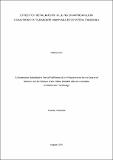Effect of retaliatory killing on African lion coalitions in Tarangire-Manyara ecosystem, Tanzania
Abstract
In landscapes where people and lions coexist, conflicts are common due to livestock predation
and threats to human safety. Retaliatory lion killing by humans is often a consequence of such
conflicts. In Tarangire-Manyara Ecosystem (TME) lion population are threatened by retaliatory
killing, but little is known how retaliatory killing affects lion social structure, particularly male
coalitions. Fourteen years dataset of lion monitoring was used to map the spatial-temporal
dynamics of male coalition. Lion killing data was used to assess the effects of retaliatory lion
killing on the male coalitions for ten prides. Interviews on two hundred and fourteen
respondents was used to assess the attitudes and awareness of the community on effects of
retaliatory killing to lions. Lion coalitions were found larger and lasted for a longer tenure
period in low-risk areas of retaliatory killing, and far from active hunting blocks. Twelves lions
were killed for livestock loss, while fifteen attempts of lion killing were prevented. Attitude
towards lion existence and conservation was positive for young people (18-35 years) compared
to older age class. People with primary or secondary level of education were more likely to
have lions killed if they attack livestock compared to people with no formal education.
Community attitude on retaliation effect varied widely, as people perceptions depends on
benefits/losses they incurred. This study showed retaliatory killing negatively affects long-term
lion coalition and population. Also, recommends implementing better education programs and
participatory conservation activities to protect the declining lion populations.

